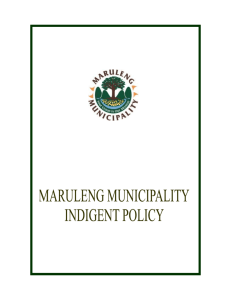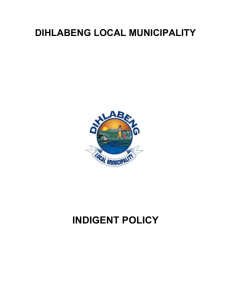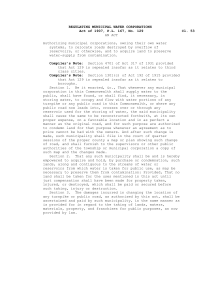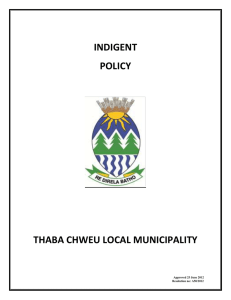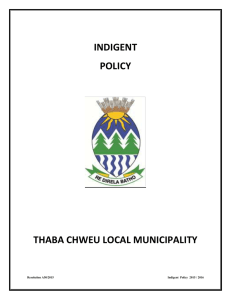seen but not heard
advertisement
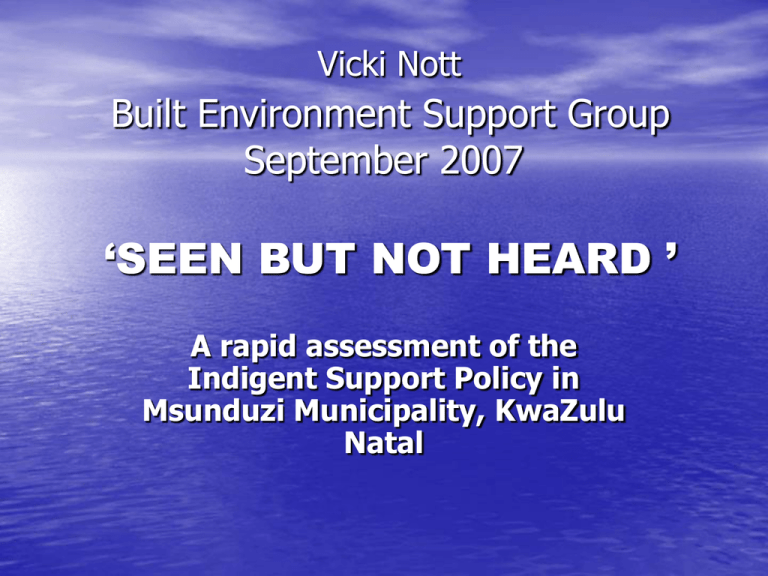
Vicki Nott Built Environment Support Group September 2007 ‘SEEN BUT NOT HEARD ’ A rapid assessment of the Indigent Support Policy in Msunduzi Municipality, KwaZulu Natal Workshop Aim • A presentation of the results of a research study done by BESG on Msunduzi Municipality’s Indigent Support Policy for rates and service charges relief • Plenary session – discussion on research findings FUNDERS • This research was funded by the Good Governance Learning Network (GGLN) and The Child Advocacy Project (CAP) FUNDERS • BESG acknowledges the generous support of the Ford Foundation in funding its programme of promoting good governance and deepening democracy, which inspired this research study. • BESG thanks the Office of Strategic Analysis and Research of the Msunduzi Municipality, for hosting this presentation. Underlying Principles • The South African Government Communication and Information Services define indigent free basic services as: “Services provided by Government at no charge to poor households. The services include water, electricity, sanitation, and waste removal. These services are provided by municipalities and include a minimum amount of electricity, water and sanitation that is sufficient to cater for the basic needs of a poor household.” (SA Government Services, 2007). Underlying Principles • The right to access clean water and adequate sanitation was • • • • • • included in the new Constitution of South Africa in 1996. The provision of water and electricity services have increasingly been devolved to local municipalities. The term indigent, in the South African Context, refers to poor people who are entitled to municipal services support. 2001 - The Department of Water Affairs and Forestry (DWAF) declared the right to a basic supply of free water. 2004 - Msunduzi Municipality formulated an indigent water policy. 2005 – Implementation of a pilot free electricity service. 2006 – Municipality introduced a moratorium on action for rates debt for child headed households; and extended rebates to flat dwellers. National policy guidelines • Free Basic Water • 6kl of free water per household/month or 200 litres per household/day • Based on World Health Organisation (WHO) guideline of 25 litres per person per day living in an eight-member household. • Free basic electricity • Indigent households are entitled to free basic electricity of 50 kilo-Watt hours (kWh)/month. • Free basic Sanitation and Refuse Removal • DWAF are currently developing a framework for the provision of free basic sanitation. • The Department of Environmental Affairs (DEAT) is in the process of developing a framework for the provision of free basic refuse removal. Msunduzi Municipality’s Indigent Policy Level 1 • Automatic qualification as an indigent • The criterion to qualify automatically for the support requires house • • • • • and land value to be under R30 000. Automatic qualification entitles a beneficiary to receive a free 20 Amp electrical supply and 50kWh electricity consumption per month; Free 6kl water, with the balance at normal tariff; Free sewerage; Free refuse; Full exemption from rates Msunduzi Municipality’s Indigent Policy Level 2 • On application – house and land value between R30001 and R40000 – subject to a limit of 20 Amp and a water restriction device. • The package provides for a 20 Amp electricity supply at a reduced rate; free 50kWh electricity with the balance at normal tariff; • Free 6kl water the next 7-12 kl at reduced rate, and any consumption in excess of 12 kl at the normal rate; • Reduced tariffs for sewerage and refuse; and • Full rates exemption. Msunduzi Municipality’s Indigent Policy Level 3 • On Application as an indigent - house and land value over R40 001– subject to a limit of 20 Amp and a water restriction device.” • Subject to maximum income of R2136 per month. • Household entitled to 20 Amp electricity supply at reduced rate; free 50KWh electricity – balance at normal tariff. • Free 6kl water, the next 7-12 kl at reduced rate, thereafter normal rate. • Reduced tariffs for sewerage and refuse • A rebate of 40% rates if income less than R1740 or rebate of 33.3% if monthly income between R1740-R2136. STATEMENT OF THE PROBLEM • Accessibility and application of the policy are problematic. • Investigation of Ward Councillors’ roles in disseminating the free basic support policy. • Appropriateness of defining indigent beneficiaries in relation to property values. Research Aim • Who is indigent? The policy does not define the term, and is implied in relation firstly to property value, and secondly to household income. • How and where is the policy disseminated? • How aware are Ward Councillors of the policy, and how effective are they in disseminating the policy and referring qualifying applicants? • What consumer education is provided on services, consumption, and billing? • How user-friendly is the sliding scale policy on rates concessions; and how will it be affected by the new Municipal Property Rates Act (Act 6 of 2004), which requires individual, market-related property rates assessments? Methodology • A focus group discussion was held with three officials from the Finance Department, and individual interviews were held with senior officials from the Water Department and Electricity Department. • Five Ward Councillors, representing areas where there would be a high prevalence of indigent households. were interviewed. • Physical inspections of municipal venues, deemed appropriate for disseminating indigent support information, were conducted. • A quantitative survey was done in five low-income areas in Msunduzi Municipality. The survey included 55 residents from Ashdown, Imbali Unit 13, Eastwood, France, and Oribi. Limitations to the study • Funding and time constraints prevented a more • • • comprehensive study in a broader context. Difficulty in locating a municipal official responsible for managing and supervising the dissemination of the Indigent Support Policy. Ward Councillors’ lack of response (had to resample). Reluctance from Eastwood residents to participate in the survey. Results of the interviews with Msunduzi Municipal Officials • • • • Finance Department is custodian of the policy. Lack of inter-departmental co-operation and communication. No Consumer educational programmes in place. Suspension of water services to households exceeding free allocation. • Free basic electricity not reaching indigent people as intended. • Free basic electricity allocation too low. • Indigent support depends largely on Municipality's financial status. Recommendations made by Municipal Officials and Ward Councillors on improving dissemination • Significant barrier in communicating the policy. • Dissemination methods are through Area Based Management, Izimbizo, Umpithi News, pamphlets, and local press: Gap between theory and actuality/ practice. • The Water and Electricity Departments suggested: • Provision of an effective customer call centre system. • National, provincial and local media adverts and public awareness campaigns. • Ongoing workshops to equip Councillors. • Road shows to inform the public on policy conditions and application procedures. • • • • • Results of interviews with Ward Councillors Some degree of inaccuracy in interpretation of the policy. Good understanding of application process. Improved training of Ward Councillors required. Increase dissemination efforts necessary Suggestions by Ward Councillors Regular workshops for community Improve municipal officials levels of efficiency and knowledge Door-to-door awareness campaigns Educational campaigns through the media Poster displays in municipal buildings • Policy adjustments needed to serve more poor people. • Lack of cooperation and communication between stakeholders. Beneficiary survey results Survey Area Area Assumed value4 no Percent Unit 1-3 Phases <R30000 7 13.5 Ashdown >R40000 11 21.2 Eastwood >R40000 3 5.8 Eastwood (CHH)+ >R40000 1 1.9 France <R30000 14 26.9 Imbali Unit 13/formal(old stock) >R40000 1 Oribi >R40000 15 28.8 52 100 Total 1.9 Policy Awareness Not heard 34 65.4% Radio 7 13.5% Word of mouth 4 7.7% Councillor 3 5.8% Municipality +other 1 1.9% Pamphlet 1 1.9% No response 2 3.8% Total 52 100% Free basic support - Qualification Automatic qualification % YES 25 48.1% NO 26 50% NO RESPONSE 1 1.9% TOTAL 52 100% Pay for water % Pay for electricity YES 9 17.3 YES 36 69.2 NO 43 82.7 NO 5 9.6 TOTAL 52 100 PREPAID 11 21.2 TOTAL 52 100 Consumer complaints • No or little information given to the public regarding free basic support. • Councillor either not available, or people do not know where to find their • • • • • • • • Ward Councillor. Need clarity on the application process. Applied for free basic support but never heard from municipality. Complaints about the high cost of electricity and electrical black-outs. The need for reduced or free electricity. Water services not responding to reported meter leaks. need for municipal or government support in acquiring their own home High crime and unemployment requested assistance in paying rent and services. Observational Site Visits • No visual evidence of Indigent Support Policy at • • • Councillors’ Common Room at the City Hall. Ward Councillor’s office in Eastwood revealed visible information (pamphlets). Accurate communication of the policy and policy procedures by the Eastwood Ward Councillor’s personal assistant. No visual evidence of consumer information on the walls/behind counters at municipal offices of Imbali and AS Chetty building. Is the term Indigent, as defined in the Policy, in terms of qualification for free basic services, accurate and appropriate? • The term “indigent” as applied in Msunduzi Municipality’s Indigent Support Policy is defined primarily in relation to the global assumed value of properties in each distinct area in which people reside. The current definition of indigent tends to be confusing in the following ways: • Free basic support not specific to the poor • Poor people living in areas valued over R30 000 need to go through a complicated annual application process. • The current system not conducive to establishing the extent to which the policy is reaching those that qualify through application • Re-evaluation may effect those indigents that have improved their homes over time. • The maximum income qualification criterion of R2136 may be inappropriate (household size & composition, poverty datum line not factored). • A standard, uncomplicated definition of indigent would benefit the target population. Are current dissemination methods effective? • The study results reflect poor dissemination of the Indigent Policy. Factors contributing to inadequate dissemination are: • The lack of a dedicated municipal representative responsible for disseminating the policy. • The lack of a comprehensive information dissemination strategy. • Automatic exemptions based on a property value less than R30000 and no enforced water restrictions on exceeding consumption, undermines the need for public awareness. • The Indigent Policy document is complex and difficult to interpret. • Reliance on the Mayoral gatherings (Izimbizo) for disseminating the policy is ineffective. • More effective and systematic dissemination is essential. Recommendations This study makes the following recommendations: • The re-formulation of qualifying criteria based primarily on household income. • Additional factors directly effecting consumption patterns should be considered. • Inter-departmental input, from all departments concerned with service delivery and finance, is vital to the successful implementation of indigent services support. • Systematic monitoring and evaluation of the application of indigent policy is necessary. • The indigent support policy must be designed in accordance with municipal affordability. • Current billing systems should be reviewed. • Municipality’s responsibilities to ensure policy conditions and understanding of the policy reach the intended target. • Urgent need for an effective and ongoing information dissemination strategy. Conclusion • The South African Government has dedicated the provision and access of affordable housing, sufficient water, and adequate sanitation as a basic human right to all citizens. • Msunduzi Municipality has devised a policy which is: – Inclusive: Applies relief to all categories of rates and services – Progressive: Provides for rebates on moderate consumption in excess of the free basic allowances. • This study concludes that Msunduzi Municipality’s indigent support policy falls short in the following aspects: Definition - A more appropriate policy definition based on household income and composition, rather than property value, needs to be developed. Structure - The nature and administration of the existing policy is too complex and unwieldy. Dissemination – Dissemination methods need to be urgently reviewed to ensure they reach the target groups. WE THANK YOU FOR YOUR TIME

